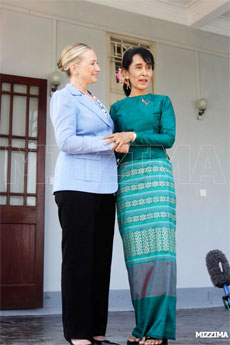US President Barack Obama’s keenness to embrace Myanmar has less to do with cuddling democracy icon Daw Aung San Suu Kyi and more to do with money, natural resources and the dragon that lurks on the country’s northern border. The landmark official visit by President Thein Sein last week to Washington to shake hands with the American leader and discuss developments in Myanmar is yet another sign that the embrace is getting tighter. But there is more to America’s new love affair than meets the eye.
 Leave aside the fact that Obama slipped up at last week’s White House press conference over the name of the Myanmar president, calling him “President Sein,” and again mispronounced Daw Aung San Suu Kyi’s name. The US president’s sloppiness is cover for the fact that Washington is taking its engagement with the Golden Land very seriously, a country viewed as a crucial piece of Obama’s foreign policy “pivot” to the Asia-Pacific region.
Leave aside the fact that Obama slipped up at last week’s White House press conference over the name of the Myanmar president, calling him “President Sein,” and again mispronounced Daw Aung San Suu Kyi’s name. The US president’s sloppiness is cover for the fact that Washington is taking its engagement with the Golden Land very seriously, a country viewed as a crucial piece of Obama’s foreign policy “pivot” to the Asia-Pacific region.
On the face of it, Washington stresses support for democratic reform, human rights, improving the economy, and paving the way for American companies to do business in the country. But, largely behind the scenes, America is pursuing a China containment strategy, aware of that country’s growing military and economic clout. Few America policymakers and think-tank experts take China’s self described strategy of “Peaceful Rise” at full face value.
China sits center-stage in US-Myanmar relations, despite Washington’s denials. Former Secretary of State Hillary Clinton went out of her way to stress the US is not opposing China, noting, “... we are not viewing this in light of any competition with China.” This is mere diplomatic obfuscation – a veneer of politeness to thinly hide the 21st century’s replaying of the Great Game, albeit on slightly different turf.
As far as Washington is concerned, Myanmar is a brick in the wall around China’s western, southern and eastern flank. As Jurgen Haacke says in an analysis entitled, “Myanmar: Now a Site for Sino-US Geopolitical Competition?” the United States has for some time generally welcomed China’s growing stature and weight. “However, Washington has also been concerned about China’s growing military capabilities and it has sought to influence China’s foreign policy choices by shaping the latter’s regional environment, not least by revitalizing relations with alliance partners and friendly states.”
What that means for US ties with Myanmar is a tighter engagement on a political and military level, with an increase in military cooperation and training between US forces and the Tatmadaw. This follows a pattern of play seen in such countries as Thailand, Taiwan, South Korea and Japan, where joint-force military games are held.
Pivoting towards Asia has seen a revitalization of Washington’s relationships in Asia and particularly Southeast Asia. This includes enhanced naval capacity in the region, two thousand marines in Australia and an increased positive involvement with ASEAN nations.
Beijing has at been at pains to limit overt sabre-rattling; however increasingly vehement disputes with fellow Asian nations over numerous small atolls and islands suggest a clear policy of force projection that unsettles other countries in the region. In recent weeks, China’s official newspaper, The People’s Daily, has raised the ante in voicing suggestions that Japan’s Ryukyu Island chain, which includes Okinawa, might well be subject to a renewed Chinese claim of sovereignty.
Thus, Washington fears China’s rise may not be peaceful, and has also been concerned that some of the economic and trade balance problems it has with China are due to the deliberately managed undervaluation of the yuan. The Middle Kingdom has increasingly been troubled by the sense that the US is interfering in the issues of human rights, Taiwan, the Tibetan Autonomous Region and the South China Sea, which it sees as either hypocritical – over human rights – or a sovereign challenge, as with the others.
What this means is that geopolitical competition over Myanmar between China and the United States will increase. Expect to see more officials from Beijing and Washington currying favor in the halls of power in Naypyitaw.


